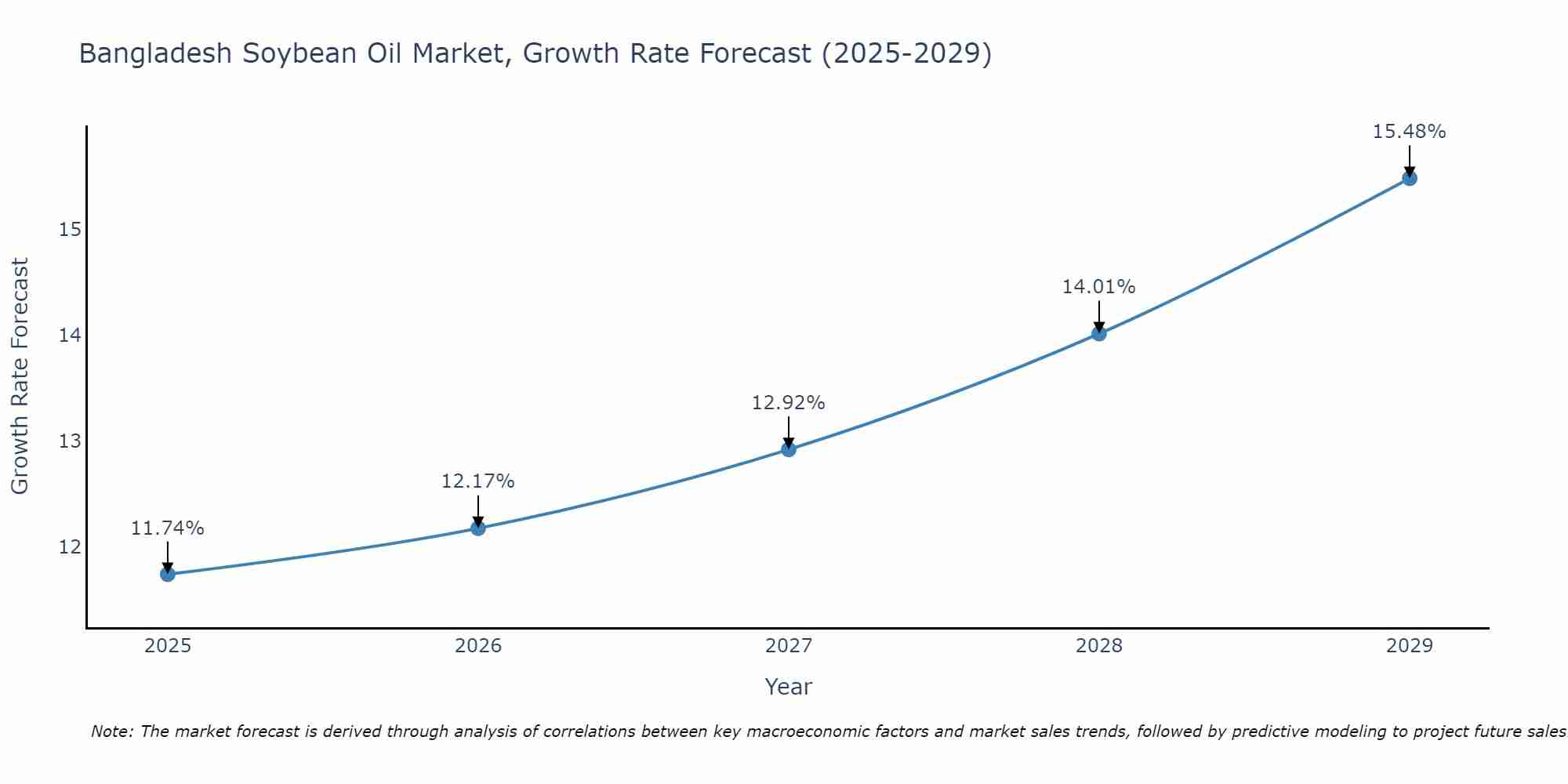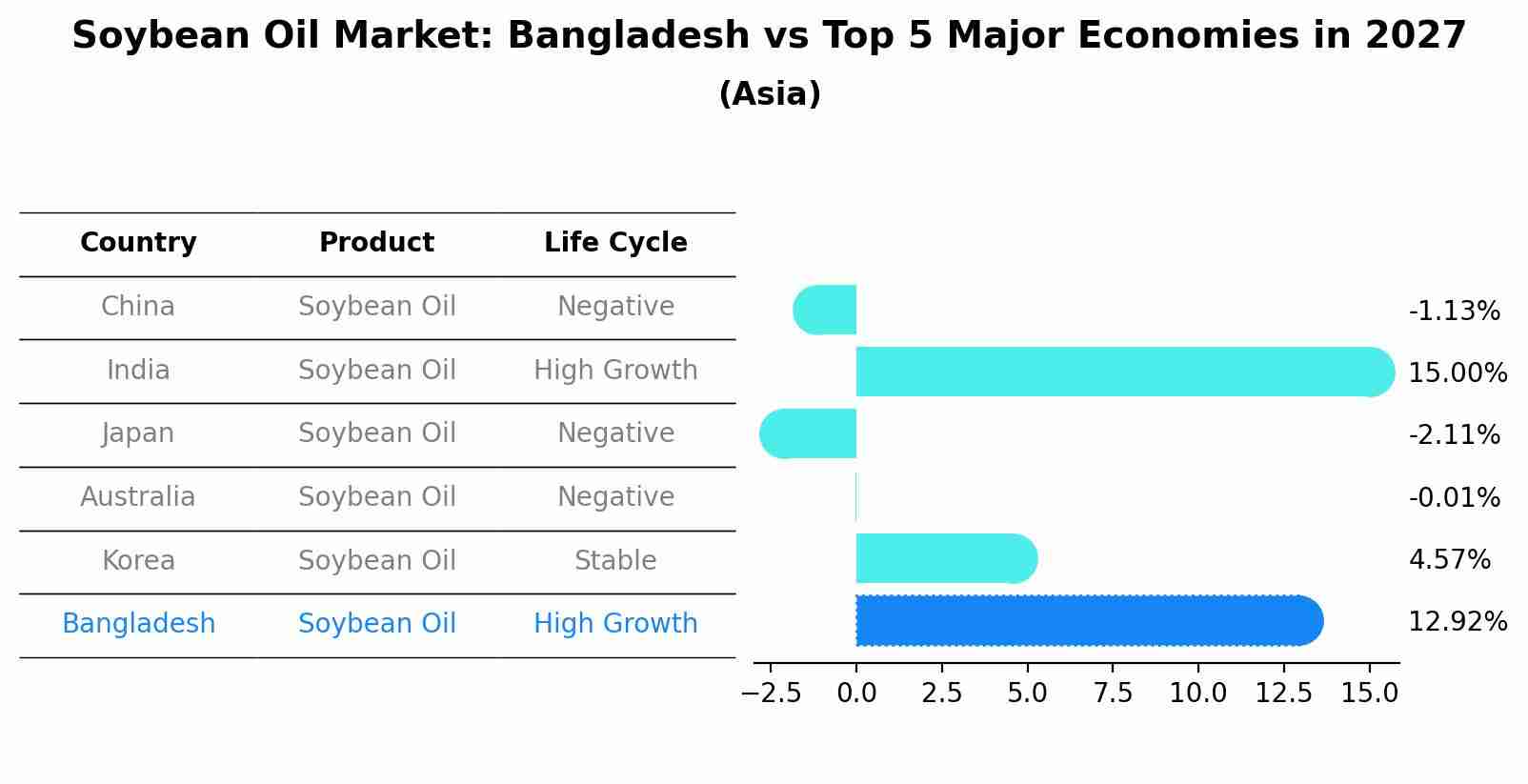Bangladesh Soybean Oil Market (2025-2031) Outlook | Revenue, Size, Trends, Value, Growth, Forecast, Industry, Companies, Share & Analysis
| Product Code: ETC385052 | Publication Date: Aug 2022 | Updated Date: Jul 2025 | Product Type: Market Research Report | |
| Publisher: 6Wresearch | Author: Summon Dutta | No. of Pages: 75 | No. of Figures: 35 | No. of Tables: 20 |
Bangladesh Soybean Oil Market Size Growth Rate
The Bangladesh Soybean Oil Market is poised for steady growth rate improvements from 2025 to 2029. Commencing at 11.74% in 2025, growth builds up to 15.48% by 2029.

Soybean Oil Market: Bangladesh vs Top 5 Major Economies in 2027 (Asia)
By 2027, the Soybean Oil market in Bangladesh is anticipated to reach a growth rate of 12.92%, as part of an increasingly competitive Asia region, where China remains at the forefront, supported by India, Japan, Australia and South Korea, driving innovations and market adoption across sectors.

Bangladesh Soybean Oil Market Synopsis
The Bangladesh Soybean Oil market is experiencing steady growth due to increasing consumer awareness about the health benefits of soybean oil compared to other cooking oils. The market is driven by factors such as the rising demand for healthier cooking alternatives, a growing population, and changing dietary preferences towards healthier options. Key players in the market are focusing on product innovation, marketing strategies, and distribution networks to cater to the evolving consumer needs. The market is also witnessing a shift towards organic and non-GMO soybean oil products as consumers become more health-conscious. Government initiatives to promote domestic soybean production are further boosting the market growth. Overall, the Bangladesh Soybean Oil market is poised for continued expansion in the coming years.
Bangladesh Soybean Oil Market Trends
As of now, the Bangladesh soybean oil market is experiencing growth due to increasing consumer awareness about the health benefits of soybean oil, such as its high omega-3 fatty acids and low saturated fat content. The market is also witnessing a rise in demand for soybean oil as a versatile cooking oil, especially in households and the food service industry. Additionally, the expanding food processing sector in Bangladesh is driving the demand for soybean oil as a key ingredient in various food products. However, challenges such as fluctuating prices of soybeans and competition from other cooking oils are impacting the market dynamics. Overall, the Bangladesh soybean oil market is poised for further growth, with opportunities for market players to innovate and expand their product offerings to meet evolving consumer preferences.
Bangladesh Soybean Oil Market Challenges
The Bangladesh Soybean Oil Market faces several challenges, including fluctuating international prices, dependency on imports due to limited domestic production, quality concerns in some imported products, and competition from other cooking oils like palm and sunflower oil. Additionally, the market is subject to government policies and regulations that can impact pricing and availability. Infrastructure limitations, such as inadequate storage facilities and transportation networks, also pose challenges in the distribution of soybean oil across the country. Consumer preferences and awareness about the health benefits of soybean oil compared to traditional cooking oils further influence market demand. Overall, navigating these challenges requires market players to adapt to changing conditions and implement strategies to ensure a competitive edge in the Bangladesh Soybean Oil Market.
Bangladesh Soybean Oil Market Investment Opportunities
The Bangladesh Soybean Oil Market presents several investment opportunities for potential investors. With a growing population and increasing disposable income, the demand for edible oils, including soybean oil, is on the rise in Bangladesh. Investing in soybean oil production facilities or distribution networks could be lucrative due to the country`s reliance on imports to meet its consumption needs. Additionally, the government`s initiatives to promote domestic production and reduce reliance on imports further support the growth potential in the soybean oil market. Leveraging technological advancements in production processes and focusing on quality control measures can help investors establish a strong presence in the market and capitalize on the increasing demand for soybean oil in Bangladesh.
Jordan Agar Market Government Policies
The government of Bangladesh has implemented several policies related to the soybean oil market to ensure food security and control prices. These policies include import tariffs and restrictions to safeguard domestic production, subsidies for soybean farmers to increase local supply, and quality control measures to maintain standards. Additionally, the government has established regulations on labeling and packaging to protect consumer interests and promote transparency. Overall, these policies aim to balance the need for imports with supporting local production, ensuring a stable supply of soybean oil in the market while controlling prices to make the product affordable for consumers in Bangladesh.
Bangladesh Soybean Oil Market Future Outlook
The future outlook for the Bangladesh soybean oil market appears promising with steady growth anticipated in the coming years. Factors such as increasing consumer awareness of the health benefits of soybean oil, rising disposable income levels, and the expanding food processing industry are expected to drive market demand. Additionally, the government`s initiatives to promote domestic soybean production and reduce dependency on imports could further boost the market. However, challenges such as volatile prices of soybeans in the global market, competition from other cooking oils, and potential supply chain disruptions may also impact the market. Overall, with the right strategies in place to address these challenges and capitalize on growth opportunities, the Bangladesh soybean oil market is poised for a positive trajectory in the future.
Key Highlights of the Report:
- Bangladesh Soybean Oil Market Outlook
- Market Size of Bangladesh Soybean Oil Market, 2024
- Forecast of Bangladesh Soybean Oil Market, 2031
- Historical Data and Forecast of Bangladesh Soybean Oil Revenues & Volume for the Period 2021 - 2031
- Bangladesh Soybean Oil Market Trend Evolution
- Bangladesh Soybean Oil Market Drivers and Challenges
- Bangladesh Soybean Oil Price Trends
- Bangladesh Soybean Oil Porter's Five Forces
- Bangladesh Soybean Oil Industry Life Cycle
- Historical Data and Forecast of Bangladesh Soybean Oil Market Revenues & Volume By End-Use for the Period 2021 - 2031
- Historical Data and Forecast of Bangladesh Soybean Oil Market Revenues & Volume By Food for the Period 2021 - 2031
- Historical Data and Forecast of Bangladesh Soybean Oil Market Revenues & Volume By Feed for the Period 2021 - 2031
- Historical Data and Forecast of Bangladesh Soybean Oil Market Revenues & Volume By Industrial for the Period 2021 - 2031
- Bangladesh Soybean Oil Import Export Trade Statistics
- Market Opportunity Assessment By End-Use
- Bangladesh Soybean Oil Top Companies Market Share
- Bangladesh Soybean Oil Competitive Benchmarking By Technical and Operational Parameters
- Bangladesh Soybean Oil Company Profiles
- Bangladesh Soybean Oil Key Strategic Recommendations
Frequently Asked Questions About the Market Study (FAQs):
- Single User License$ 1,995
- Department License$ 2,400
- Site License$ 3,120
- Global License$ 3,795
Search
Thought Leadership and Analyst Meet
Our Clients
Related Reports
- South Africa Stationery Market (2025-2031) | Share, Size, Industry, Value, Growth, Revenue, Analysis, Trends, Segmentation & Outlook
- Afghanistan Rocking Chairs And Adirondack Chairs Market (2026-2032) | Size & Revenue, Competitive Landscape, Share, Segmentation, Industry, Value, Outlook, Analysis, Trends, Growth, Forecast, Companies
- Afghanistan Apparel Market (2026-2032) | Growth, Outlook, Industry, Segmentation, Forecast, Size, Companies, Trends, Value, Share, Analysis & Revenue
- Canada Oil and Gas Market (2026-2032) | Share, Segmentation, Value, Industry, Trends, Forecast, Analysis, Size & Revenue, Growth, Competitive Landscape, Outlook, Companies
- Germany Breakfast Food Market (2026-2032) | Industry, Share, Growth, Size, Companies, Value, Analysis, Revenue, Trends, Forecast & Outlook
- Australia Briquette Market (2025-2031) | Growth, Size, Revenue, Forecast, Analysis, Trends, Value, Share, Industry & Companies
- Vietnam System Integrator Market (2025-2031) | Size, Companies, Analysis, Industry, Value, Forecast, Growth, Trends, Revenue & Share
- ASEAN and Thailand Brain Health Supplements Market (2025-2031) | Strategy, Consumer Insights, Analysis, Investment Trends, Opportunities, Growth, Size, Share, Industry, Revenue, Segments, Value, Segmentation, Supply, Forecast, Restraints, Outlook, Competition, Drivers, Trends, Demand, Pricing Analysis, Competitive, Strategic Insights, Companies, Challenges
- ASEAN Bearings Market (2025-2031) | Strategy, Consumer Insights, Analysis, Investment Trends, Opportunities, Growth, Size, Share, Industry, Revenue, Segments, Value, Segmentation, Supply, Forecast, Restraints, Outlook, Competition, Drivers, Trends, Demand, Pricing Analysis, Competitive, Strategic Insights, Companies, Challenges
- Europe Flooring Market (2025-2031) | Outlook, Share, Industry, Trends, Forecast, Companies, Revenue, Size, Analysis, Growth & Value
Industry Events and Analyst Meet
Whitepaper
- Middle East & Africa Commercial Security Market Click here to view more.
- Middle East & Africa Fire Safety Systems & Equipment Market Click here to view more.
- GCC Drone Market Click here to view more.
- Middle East Lighting Fixture Market Click here to view more.
- GCC Physical & Perimeter Security Market Click here to view more.
6WResearch In News
- Doha a strategic location for EV manufacturing hub: IPA Qatar
- Demand for luxury TVs surging in the GCC, says Samsung
- Empowering Growth: The Thriving Journey of Bangladesh’s Cable Industry
- Demand for luxury TVs surging in the GCC, says Samsung
- Video call with a traditional healer? Once unthinkable, it’s now common in South Africa
- Intelligent Buildings To Smooth GCC’s Path To Net Zero


















